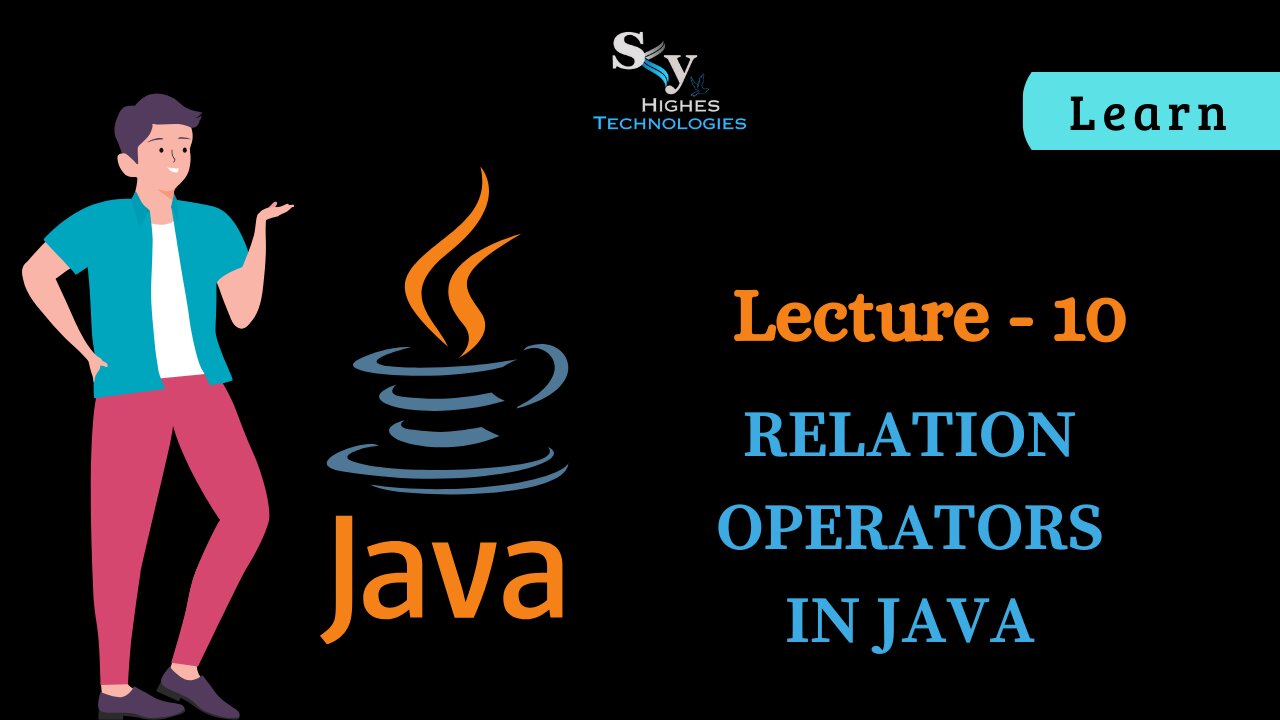Premium Only Content

#10 Relational operators in JAVA | Skyhighes | Lecture 10
Here's a breakdown of relational operators in Java, ready to make comparisons in your code:
Relational operators are like those trusty scales in your code, weighing values and determining their relationships. They ask questions like, "Is this number bigger? Is this string different? Are these values equal?"
Here are the key players:
Equal to (==): Checks if two values are identical.
Not equal to (!=): Checks if two values are different.
Greater than (>): Checks if the left operand is larger than the right operand.
Less than (<): Checks if the left operand is smaller than the right operand.
Greater than or equal to (>=): Checks if the left operand is larger than or equal to the right operand.
Less than or equal to (<=): Checks if the left operand is smaller than or equal to the right operand.
How to use them:
Place the operator between the values or variables you want to compare.
The result of a relational operation is always a boolean value: true or false.
Examples:
Java
int age = 25;
boolean isAdult = age >= 18; // true
String name = "Alice";
boolean isBob = name == "Bob"; // false
double price = 9.99;
boolean isExpensive = price > 10.0; // false
Use code with caution. Learn more
Common use cases:
Making decisions in conditional statements (like if and else)
Filtering data in loops
Validating user input
Sorting data
Key points:
Relational operators work with various data types, including numbers, strings, and booleans.
They are essential for building logic and decision-making into your Java programs.
Use parentheses to clarify the order of operations when multiple relational operators are involved.
Remember: Relational operators are like the judges of your code, making logical comparisons to guide your program's flow. Master them, and you'll unlock a whole new level of decision-making power in your Java creations!
-
 2:19:30
2:19:30
Side Scrollers Podcast
5 hours agoAngry Joe’s TDS/Halo Meltdown + Console War is OVER + Twitch Staff FIRED + More | Side Scrollers
34.7K9 -
 1:13:46
1:13:46
DeVory Darkins
3 hours agoDemocrat Voters get CRUSHING NEWS as Trump celebrates MAJOR TRADE DEAL
118K46 -
 14:54
14:54
The Kevin Trudeau Show Limitless
5 hours agoThe Hidden Force Running Your Life
2.9K2 -
 1:00:11
1:00:11
Mark Kaye
4 hours ago🔴 Joe Biden Autopen Scandal Update - Staff Paid MILLIONS To Keep Quiet!
13.7K2 -
 LIVE
LIVE
SternAmerican
1 day agoELECTION INTEGRITY CALL – WED, OCT 29 · 2 PM EST | FEATURING NEW JERSEY
107 watching -
 1:05:34
1:05:34
Timcast
4 hours agoDemocrats SUE, Trump USDA Says ITS DONE, No Food Stamps Will Come, Riots Feared
167K212 -
 1:59:16
1:59:16
The Charlie Kirk Show
3 hours agoProud to Be American? + VA and NJ + Charlie's Education Vision | Maloney, Arnn | 10.29.2025
62.4K12 -
 38:32
38:32
Code Blue Cam
4 hours agoHow Police Stopped a Potential Church Massacre...
16.2K4 -
 1:04:24
1:04:24
Sean Unpaved
3 hours agoBLUE JAYS SHOCK THE WORLD: Series Tied!, NFL Deadline Meltdown + NBA's Cup Chaos Begins
22.6K1 -
 LIVE
LIVE
Dr Disrespect
4 hours ago🔴LIVE - DR DISRESPECT - BATTLEFIELD 6 - REDSEC DUOS - WIN WIN WIN
1,627 watching